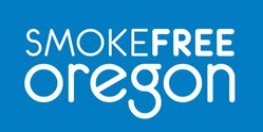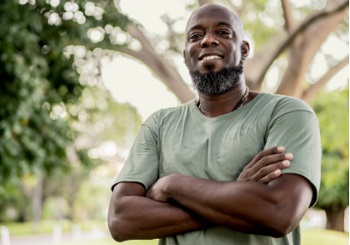Cancer in Oregon
Cancer is the leading cause of death in Oregon. Some geographic areas and demographic groups of people in Oregon experience higher cancer rates than others, especially when there is less access to cancer screening, detection and treatment services. This is also true for communities where tobacco use, alcohol use, poor nutrition and low levels of physical activity are more common.
Cancer Prevention and Screening Programs
Tobacco and Cancer Prevention
Tobacco use, including exposure to secondhand smoke increases a person's risk of
developing lung cancer. In fact, 80-90% of lung cancer deaths are linked to smoking tobacco.
 Smokefree Oregon
Smokefree Oregon
Smokefree Oregon brings together communities, health workers, and individuals to reduce tobacco use and protect health. Visit the
Smokefree Oregon Website to:
- Talk with experts in your community
- Learn how to support others to quit
- Find the latest research and prevention tools
Oregon Tobacco Quitline
Ready to Quit Smoking or Vaping? Quitting helps your health immediately—and there’s help available.
Get free support from the Oregon Tobacco Quit Line:
- Call: 1-800-QUIT-NOW (1-800-784-8669)
- Español: 1-877-2NO-FUME
- TTY: 1-877-777-6534
- Text “READY” to 34191
- Visit:
Quit Line Website
Want to do it your way? Pharmacists can also help you build a quit plan.
Alcohol and Cancer Prevention
Approximately 30% of liver cancer cases are attributed to excessive alcohol consumption. Drinking alcohol also increases the risk of developing other types of cancers such as breast, prostate, colorectal, mouth, throat, voice box and esophageal cancers. Alcohol is classified as a Group 1 carcinogen, meaning it is known to cause cancer. Because alcohol is a carcinogen, lower levels of drinking can also be harmful even if you don’t feel drunk.
Rethink the Drink
Oregon’s
Rethink the Drink campaign helps people better understand the health risks of drinking.
Breast and Cervical Cancer Screening: ScreenWise

ScreenWise is a statewide program supporting access to free breast and cervical cancer screening and diagnostic services to individuals living in Oregon who are uninsured or underinsured where costs to access screening services is a hardship. The ScreenWise mission is to maintain a network of health care providers and community partners to support the early detection of breast and cervical cancer.
Patients diagnosed with breast or cervical cancer may be eligible for treatment through the State Medicaid Breast and Cervical Cancer Treatment Program (BCCTP), regardless of whether they were enrolled in ScreenWise when they were diagnosed. Call OHP at 800-699-9075 for further information regarding BCCTP.
If you are a provider or prospective patient seeking information about ScreenWise, please call 877-255-7070. If you want to speak with a ScreenWise Specialist, call 971-673-0581.
Colorectal cancer - The cancer YOU can prevent

In Oregon, colorectal cancer is the fourth most common type of cancer diagnosed and the fourth leading cause of cancer death.
The good news: Screening can prevent it or catch it early when it is often easier to treat.
HPV-related cancers
Human Papillomavirus (HPV) is common and easily spread through direct skin-to-skin contact during sexual activity. HPV has been linked to six different cancer types (cancer of the cervix, vulva, vagina, anus, penis and the mouth and and throat).
Being vaccinated for HPV is important to protect against cancers caused by HPV infections. More information can be found on the
OHA HPV Resources page.
If you’re interested in getting involved in increasing awareness of HPV vaccination and immunization rates in Oregon, join the statewide vaccination coalition,
Immunize Oregon and its partner, the HPV Prevention Alliance.
Lung cancer prevention: Have you tested your home for radon?
Radon gas is a naturally occurring radioactive gas that you cannot smell or see and can build up to unhealthy levels in our homes. Radon gas is the second leading cause of lung cancer (second only to cigarette smoking). Radon gas is also the leading cause of lung cancer in non-smokers. The Environmental Protection Agency estimates that 21,000 people die each year in the United States as the result of radon induced lung cancer.
The only way to know if your home has high radon levels is to test it. You can:
Liver cancer prevention: Addressing viral hepatitis
Liver cancer rates in Oregon are rising. Over half of liver cancer cases are attributed to viral hepatitis B and C, with some demographic groups experiencing much higher rates than others. Knowing transmission and prevention strategies, and getting screened for viral hepatitis, can help keep you safe from viral hepatitis-related liver cancer.
Living Well as a Cancer Survivor
Many people with cancer want to take charge of their health. Online and in-person health education classes and self-management programs are offered throughout Oregon.
Search Oregon self-management programs for the classes listed below
Just some of the classes offered are as follows:
-
Chronic Disease Self-Management Program is a six-week evidence-based interactive workshop program designed to help adults with chronic conditions learn strategies for managing their health and improving their quality of life. This program is also offered in a culturally adapted Spanish version,
Tomando control de
su
salud.
-
 Healthy Heart Ambassadors is a 4-month duration evidence-based program that helps participants to lower and manage their blood pressure. The program empowers participants to measure and monitor their blood pressure using proper technique, provides individualized support from a program facilitator and nutrition education for participants to learn about ways to eat healthier.
Healthy Heart Ambassadors is a 4-month duration evidence-based program that helps participants to lower and manage their blood pressure. The program empowers participants to measure and monitor their blood pressure using proper technique, provides individualized support from a program facilitator and nutrition education for participants to learn about ways to eat healthier.
-
Walk With Ease is a community-based physical activity and self-management education program and includes health education, stretching and strengthening exercises, and motivational strategies.
-
Freedom From Smoking is a proven way to quit smoking, even if you have tried to quit before. You will join other people who want to quit for a seven-week workshop led by a trained facilitator who will help you set goals, provide resources and ongoing encouragement. Quitting is hard and you do not have to do it alone.